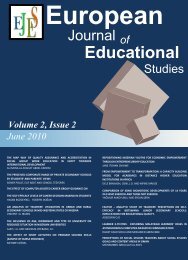the psychological consequences of cohabitation among students of ...
the psychological consequences of cohabitation among students of ...
the psychological consequences of cohabitation among students of ...
Create successful ePaper yourself
Turn your PDF publications into a flip-book with our unique Google optimized e-Paper software.
Ozean Journal <strong>of</strong> Applied Sciences 6(2), 2013<br />
representational survey, nearly 66% <strong>of</strong> high school senior boys and 61% <strong>of</strong> <strong>the</strong> girls indicated that <strong>the</strong>y agreed or<br />
mostly agreed with <strong>the</strong> statement claiming that it is usually a good idea for a couple to live toge<strong>the</strong>r before<br />
getting married in order to find out whe<strong>the</strong>r <strong>the</strong>y can really get along. Nearly three quarters <strong>of</strong> <strong>the</strong> <strong>students</strong><br />
slightly more girls than boys stated that “a man and woman who lived toge<strong>the</strong>r without being married are ei<strong>the</strong>r<br />
experimenting with a worth while alternative lifestyle or “doing <strong>the</strong>ir own thing and not affecting anyone else”.<br />
Meanwhile statistics has shown that this <strong>cohabitation</strong> phenomenon <strong>among</strong> <strong>students</strong> has a far reaching effect on<br />
<strong>the</strong>ir later lives. However, <strong>the</strong> effects are both positive and negative but more on <strong>the</strong> negative side. Although<br />
most <strong>the</strong>ories <strong>of</strong> marital choice predict that <strong>cohabitation</strong> would increase stability <strong>of</strong> later marriages for those<br />
couples who do marry, evidence to date suggests <strong>the</strong> contrary. Couples that cohabit prior to marriage seem to<br />
end <strong>the</strong>ir marriages at significantly higher rates than couples who never lived toge<strong>the</strong>r before wedding Bennet,<br />
Blanc & Bloom, 1998; DeMaris& Rio, (1992). According to Haruna (2008), <strong>the</strong>re was a study on couples living<br />
toge<strong>the</strong>r in one <strong>of</strong> <strong>the</strong> campuses in <strong>the</strong> Federal Polytechnic, Bida, which revealed several heartbreaks one after<br />
<strong>the</strong> o<strong>the</strong>r. It is very shocking that casual sex and <strong>cohabitation</strong> are now becoming one <strong>of</strong> <strong>the</strong> favourable subjects<br />
<strong>of</strong> <strong>the</strong> Nigerian youths as you hear jokes about it from our campus boys and girls. Even secondary school<br />
<strong>students</strong> practice <strong>the</strong> act as <strong>the</strong>y see it glorified in movies and televisions. They have become convinced that<br />
<strong>cohabitation</strong> and sex are <strong>the</strong> means to improve <strong>the</strong>ir love towards each o<strong>the</strong>r. On <strong>the</strong> o<strong>the</strong>r hand, young people<br />
who abstain from sex are seen as weird and branded by <strong>the</strong>ir peers as religious fanatics.<br />
Statement <strong>of</strong> <strong>the</strong> Problem<br />
The majority <strong>of</strong> young Nigerian men and women today want to marry and have children. Therefore, many <strong>of</strong><br />
<strong>the</strong>m see <strong>cohabitation</strong> as a way <strong>of</strong> life and to test <strong>the</strong>ir compatibility and probably <strong>the</strong> chances <strong>of</strong> long-lasting<br />
marriage. The reason being that after living toge<strong>the</strong>r for several years and having „cordial relationship‟ a person<br />
will eventually have a marriageable mate. Traditionally, <strong>cohabitation</strong> <strong>among</strong> university <strong>students</strong> or nonuniversity<br />
youths is forbidden in most Nigerian cultures. It is seen as an act that must not be conducted or<br />
practiced ei<strong>the</strong>r secretly or openly. Despite this condemnation, some youths still practice it with impurity. It has<br />
become a problematic issue that it threatens to destroy <strong>the</strong> marital institution or life which is now almost<br />
becoming beyond control. A lot <strong>of</strong> marriages collapse/brake up few years after wedding which depicts <strong>students</strong>‟<br />
perception <strong>of</strong> <strong>cohabitation</strong> as a cont5ract that can terminate any time. It is presumed that campus <strong>cohabitation</strong><br />
does not last and where it doe4s, it breads various problems in later marital life. Therefore, this study was<br />
embarked upon to investigate <strong>the</strong> <strong>psychological</strong> <strong>consequences</strong> <strong>of</strong> <strong>cohabitation</strong> <strong>among</strong> <strong>students</strong> <strong>of</strong> Tai Solarin<br />
University <strong>of</strong> Education, Ijagun, Ijebu-Ode, Ogun State, Nigeria.<br />
Hypo<strong>the</strong>ses<br />
The following hypo<strong>the</strong>ses which guided <strong>the</strong> study were tested at 0.05 level <strong>of</strong> significance.<br />
Ho 1 - Hatred for opposite sex will not significantly be a consequence <strong>of</strong> <strong>cohabitation</strong> <strong>among</strong> <strong>students</strong><br />
<strong>of</strong> tertiary educational institutions.<br />
Ho 2 - Depression will not significantly be a consequence <strong>of</strong> <strong>cohabitation</strong> <strong>among</strong> <strong>students</strong> <strong>of</strong> tertiary<br />
educational institutions.<br />
Ho 3 - Lack <strong>of</strong> concentration leading to poor academic performance will not significantly be a<br />
consequence <strong>of</strong> <strong>cohabitation</strong> <strong>among</strong> <strong>students</strong> <strong>of</strong> tertiary educational institutions.<br />
METHODOLOGY<br />
The design <strong>of</strong> <strong>the</strong> study was <strong>the</strong> descriptive survey research. The utilization <strong>of</strong> <strong>the</strong> design was hinged on <strong>the</strong> fact<br />
that it is suitable for ga<strong>the</strong>ring data from a relatively large number <strong>of</strong> cases at a particular time. The population<br />
<strong>of</strong> <strong>the</strong> study comprised all <strong>the</strong> male and female <strong>students</strong> <strong>of</strong> Tai Solarin University <strong>of</strong> Education, Ijagun, Ijebu-<br />
Ode, Ogun State, Nigeria. The sample was made up <strong>of</strong> a total <strong>of</strong> three hundred (300) <strong>students</strong> selected through<br />
stratified random sampling technique. It involved selection <strong>of</strong> seventy five (75) <strong>students</strong> from each <strong>of</strong> <strong>the</strong> four<br />
(4) colleges in <strong>the</strong> university. The research instrument was <strong>the</strong> researcher designed Likert type questionnaire<br />
66

















